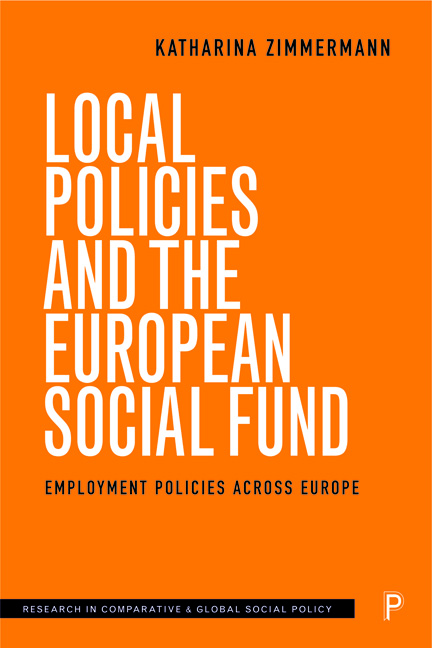Book contents
- Frontmatter
- Contents
- List of Tables and Figures
- List of Abbreviations
- Acknowledgements
- Series Preface
- 1 Introduction
- 2 Social and Employment Policies in Europe from a Multilevel Perspective
- 3 Domestic Responses to European Money: A Theoretical Perspective
- 4 The Research Programme in a Nutshell
- 5 Comparative Insights into Local Responses to the European Social Fund
- 6 What Responses Under what Conditions? Formal Qualitative Comparative Analyses and Preliminary Interpretations
- 7 Beyond Numbers: Using Case Study Insights to Support Interpretation
- 8 A Broader Perspective on Local Policies and the European Social Fund
- 9 Conclusion
- References
- Appendix: Calibration Material
- Index
6 - What Responses Under what Conditions? Formal Qualitative Comparative Analyses and Preliminary Interpretations
Published online by Cambridge University Press: 04 March 2021
- Frontmatter
- Contents
- List of Tables and Figures
- List of Abbreviations
- Acknowledgements
- Series Preface
- 1 Introduction
- 2 Social and Employment Policies in Europe from a Multilevel Perspective
- 3 Domestic Responses to European Money: A Theoretical Perspective
- 4 The Research Programme in a Nutshell
- 5 Comparative Insights into Local Responses to the European Social Fund
- 6 What Responses Under what Conditions? Formal Qualitative Comparative Analyses and Preliminary Interpretations
- 7 Beyond Numbers: Using Case Study Insights to Support Interpretation
- 8 A Broader Perspective on Local Policies and the European Social Fund
- 9 Conclusion
- References
- Appendix: Calibration Material
- Index
Summary
The previous chapter discussed local responses to the ESF in terms of both usage and change. Assessing the empirical reality of these local responses in 18 local cases in the forms of fuzzy set memberships allowed me to generate a synthesised picture of different response patterns. As Figure 5.1 of the previous chapter illustrates, there are three different configurations of usage and change across the 18 cases: in seven cases, local actors used the ESF and the field of local labour market policies experienced an ESF-induced change (quadrant 2 in Figure 5.1); in five cases, local actors used the ESF but the observed change was only marginal (quadrant 3 in Figure 5.1). In six further cases, local actors did not use the ESF and there was no ESF-induced change (quadrant 4 in Figure 5.1). Change was not identified without usage in any case (quadrant 1 in Figure 5.1).
The fact that local actors used the ESF to a considerable extent in 12 cases out of 18 and that there was considerable change in seven cases indicates that the ESF indeed plays a crucial role in local labour market policies. However, as is clear from Figure 5.1, neither usage nor change seems to depend on obvious criteria such as the country in question or the socioeconomic situation. Although the empirical insights so far provide interesting information on the empirical distribution of usage and change at the local level in six European countries, they do not tell us anything about why usage (or change) is stronger in some cases than in others, or why we find cases where usage seems to lead to change while in others it does not. In other words, the causal mechanisms behind usage and change are still in a black box. As outlined above, this study seeks to approach causality by analysing the contextual conditions under which the causal mechanisms take place. Put differently, one aim of the study is to unravel under which conditions local actors use the ESF and under which conditions ESFinduced field change can be observed. This is the focus of this chapter.
- Type
- Chapter
- Information
- Local Policies and the European Social FundEmployment Policies Across Europe, pp. 81 - 102Publisher: Bristol University PressPrint publication year: 2019



